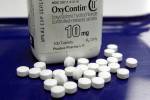Can aspirin save your life?
By KIMBERLEY MCGEE
VIEW ON HEALTH
Rheumatoid arthritis had Jerry Pollinger confined to his home, and mostly his queen bed. The aches and pains of the degenerative disease were beginning to cramp the local salesman's lifestyle. However, he did not want to be weighted down with prescription drugs or steroids that could relieve him of his nearly daily pain. His doctor disagreed, preferring he try a round of prednisone or some other steroid so that he could be at least more mobile in the present, and stem the inevitable need for a wheelchair from becoming a reality sooner rather than later. After much discussion with his physician, they agreed to hold off on the stronger stuff, for now.
Instead, Pollinger turned to aspirin, two little tablets 12 times a day. He is happy with his decision, so far.
"I feel better, and I know I'm not taking anything that has a list of side effects as long as my arm," Pollinger said. "For now it's working."
And its side effects are working as well. At age 41, he has also had a heart attack and feels comfortable, with his doctor's agreement, that the simple route of daily aspirin is also helping his heart heal, reducing his risk of future heart attacks and possibly stroke and is increasing his chances of a longer, healthier life.
"I know I'll have to go on something (stronger) one day, but I'm young," Pollinger said. "I don't want to jump in that drug pool right now. Aspirin is good for me in lots of ways, I think, and my doctor agrees."
It's a small white tablet that holds such promise. Aspirin has been a household staple in medicine cabinets for more than 100 years. Originally created to treat arthritis, the little pill has shown it can significantly slow down the damage caused by a heart attack, saving lives in the process, and assist in staving off stroke and heart disease in some patients.
"There are very few things that are non prescription that show to be as beneficial as aspirin," Carlos Fonte, cardiologist at Sunrise Hospital, said. "It's inexpensive and available to everyone."
Aspirin's effect on the heart and blood in relation to lengthening life is a relatively new discovery dating back a little more than a decade. The American Heart Association and researchers at Harvard Medical School found in 1997 that by chewing one 325 milligram aspirin tablet at the first sign of chest pain or other sign of a coming heart attack, nearly 10,000 more people would be saved and could go on to live a healthy life. Since then other studies have come to similar conclusions, with a few also noting that the continuance of taking aspirin daily or monthly could significantly cut the risk of heart attack and stroke.
WHAT MAKES ASPIRIN SUCH A GREAT GO-TO DRUG?
Its origins are steeped in good will. Bayer and Company employee Felix Hoffman created aspirin in 1897 as he was researching cures for arthritis for his ailing father. Acetylsalicylic acid, an active ingredient in willow bark that was well known as a folk remedy to relieve arthritic patients of their pain, was found by Hoffman to be a source to make a stable compound, creating the first tablet form of what is now known as aspirin. The little white tablet became the first pain reliever for the public in easy pill form.
The nonsteroidal anti-inflammatory drug works by inhibiting certain chemical processes in the body that cause pain, fever and inflammation, which medical experts say can be the slow killer behind heart attacks and strokes. Aspirin also acts as a blood thinner, reducing the tendency for the blood to form dangerous clots. This clotting ability is also what makes it useful in the prevention of heart attacks and strokes and to control unstable chest pains.
"Aspirin is a blood thinner that helps prevent platelets that stick together and cause clots from (sticking together)," Fonte said. "It's an anti platelet drug, among other things."
It's not for everyone. Children or teenagers with the flu or chickenpox, those with low blood platelets, hemophilia or von Willebrand disease, who are actively bleeding severely or have an allergic reaction to ibuprofen, naproxen or salicylates, are on the short list of those who should stay away from aspirin without their physician's approval.
Some medical conditions, such as hemophilia, pregnancy, allergies, asthma, high blood pressure or ulcers, may negatively interact with aspirin. Also if you have had oral surgery, don't use aspirin within the next week to avoid bleeding, among other issues.
While aspirin is relatively benign, the normal dosage can cause some discomfort and serious issues such as diarrhea, vomiting, nausea or even bleeding of the gastrointestinal tract. You can overdose on aspirin in large doses, which can cause someone to stop breathing or other normal body functions to become imbalanced and eventually fatal.
For those who have a tendency to get an upset stomach when using aspirin, acetaminophen products such as Tylenol are usually prescribed instead.
WHO SHOULD BE TAKING ASPIRIN?
Taking aspirin has shown to make a 25 percent reduction in heart attacks and strokes in low-to moderate risk groups, Fonte said. The percentage is significantly higher in the high risk group.
"Patients that have moderate or high risk factors, such as high cholesterol, hypertension diabetes, obesity, a family history of heart disease, in these cases aspirin has shown to reduce the risk of heart attack and stroke in patients drastically," he said. "The low risk patients, who don't have a family history, who are not obese, these people do not have as much benefit of taking aspirin in comparison."
There have been some rumblings in the global medical community that aspirin's highly touted attributes are overblown, at least. Last year a study was published that showed aspirin was not as "beneficial as we thought," Fonte said. "But that study was flawed. They use a different dosage in Europe ... they were comparing apples and oranges."
The average American dosage is 81 milligrams, which is the dosage of a baby aspirin. The average dose in Europe is 500 milligrams.
"Compare the (baby aspirin dosage) to that of someone taking 500 milligrams, they will have a higher risk of bleeding, and that's where the differences came about," he said. "That's where a lot of the mistakes happen and get printed and it's not usually dangerous if you take it in the low dose."
A low dose runs in the range of 75 to 160 milligrams. Taking aspirin as a preventative medical measure, he recommends 81 milligrams, or a baby aspirin. Active aspirin dosage is 325 milligrams, the typical adult aspirin dose.
For a man 45 years and above and a woman 55 years and above, low risk or low to moderate risk, they should be on 81 milligrams of aspirin daily as a primary prevention measure, he suggested.
"A lot of the people I see can be using aspirin (safely)," he said.
Aside from a good diet and regular exercise, there's not much you can do outside of taking medications to reduce your risk of heart attack, particularly if your parents or grandparents suffered from heart disease.
"There's 25 percent of Americans who are obese, they lead a sedentary lifestyle, and we haven't even begun talking about mom and dad," he said. "Genetics plays a big role (in the potential risk of a serious heart attack)."
Patients have asked about the side effects of an upset stomach when taking aspirin, Fonte said, but that far outweighs the benefits.
"There is much more benefit to taking aspirin than (worrying) about gastrointestinal (problems)," he said.
Dr. Bipin Saud, Gastroenterologist at Sunrise Hospital, agreed. While aspirin can cause problems in the gastro intestinal tract, and users should be well aware of symptoms that can lead to serious problems, Asprin's benefits are impressive.
"Aspirin blocks the synthesis of prostaglandins in the body," Saud explained. "Prostaglandin is a chemical also found in the lining of the stomach and intestine which has a cytoprotective role (cell protection)."
The cytoprotective role of prostaglandins includes stimulation of mucin and bicarbonate secretion by cells which protect cells in the acidic milieu of the stomach. PG also enhances blood flow and oxygen delivery to the cells in the stomach and intestines. When these protective effects of PGs are inhibited by aspirin, side effects can occur.
"Aspirin, even a low dose used for heart conditions and prophylaxis, is associated with increased risk of gastrointestinal toxicity such as ulcer disease," he said. "If patients have symptoms while on aspirin, they should consult a doctor as it may be from ulcer disease."
It is usually treated with a class of medication called Proton Pump Inhibitors, such as Prilosec, Prevacid and Aciphex, which inhibits secretion of acid in the stomach, he said.
"The doctor will make a decision as to stop or continue aspirin at this point, depending on the indication for aspirin use on that particular patient," Saud said.
Some patients may need to be on long term maintenance therapy with PPI if they will be on using aspirin daily to prevent side effects from chronic aspirin use.
"Also if patients will be on long term aspirin use, it may be reasonable to check for bacteria called Helicobacter Pylori (H Pylori) that reside in the stomach," he suggested. "These bacteria itself can cause ulcers and possibly can worsen symptoms from aspirin use."
Gastro esophageal reflux disease and irritable bowel syndrome should not necessarily make someone wary of aspirin use.
"If one has GERD, it should be treated for symptom control and to prevent long term adverse (damage) of untreated GERD," he said.
However, the risk of side effects from aspirin use increases if there is a history of one or more conditions such as previous ulcer disease or bleeding, an age of greater than 60, concurrent use of steroids or blood thinners for other medical conditions.
Chronic use of aspirin as opposed to short term use, untreated H Pylori infection and use of a class of drugs for depression, SSRI (selective serotonin reuptake inhibitors), may also increase ulcer risk, he said.
"If someone takes aspirin without consulting a doctor and has gastrointestinal side effects, they should stop taking aspirin and consult a doctor as it may be from ulcer disease," he said.
Ulcer disease can be life threatening as it can cause bleeding and bowel perforation which require prompt medical care.
"Some patients unknowingly take more aspirin to control abdominal pain which may be from the ulcer disease caused by chronic aspirin use and this may make the situation worse," he said. "Also, patients may not always have classic gastrointestinal symptoms from aspirin use and may present with anemia due to slow chronic blood loss from the gastrointestinal tract."
Bottom line, if you have a family history of heart attack or stroke going back to your grandparents, are a smoker, are older than 60 years of age and live a sedentary lifestyle, a small white pill could be a lifesaver.
"People forget the big picture," Fonte said. "They look at $3 a pill for many of the big drugs, but they should look at the simple things in life, such as diet and the other things we've talked about here. But, simply, there just aren't that many things that have proven to be as beneficial as aspirin."























